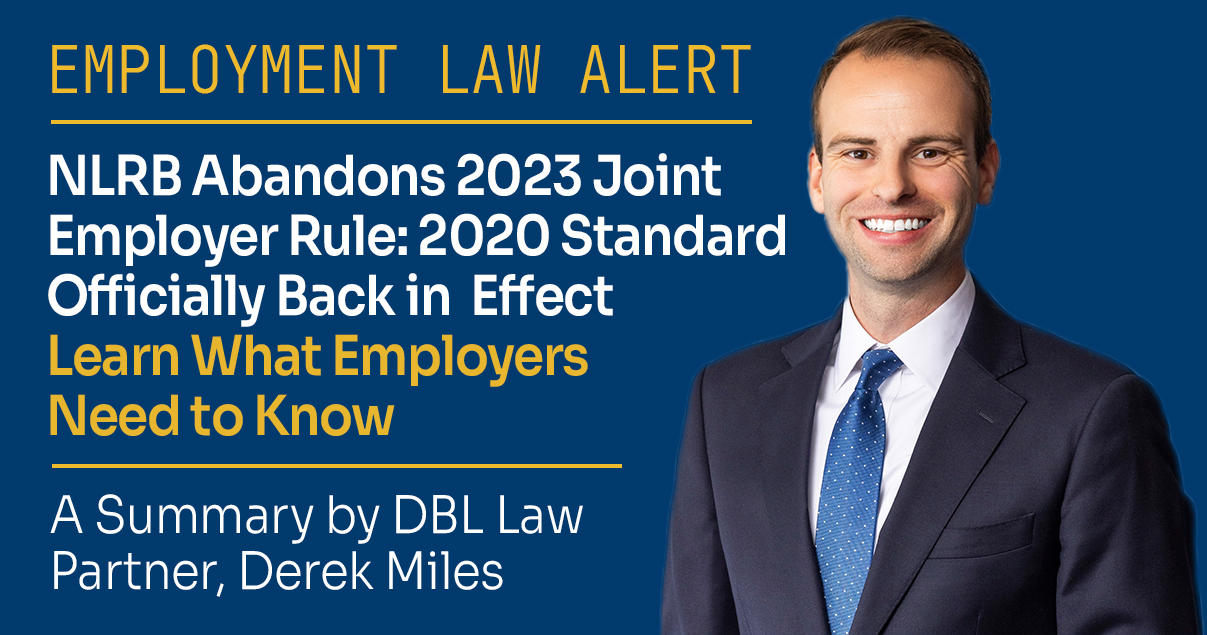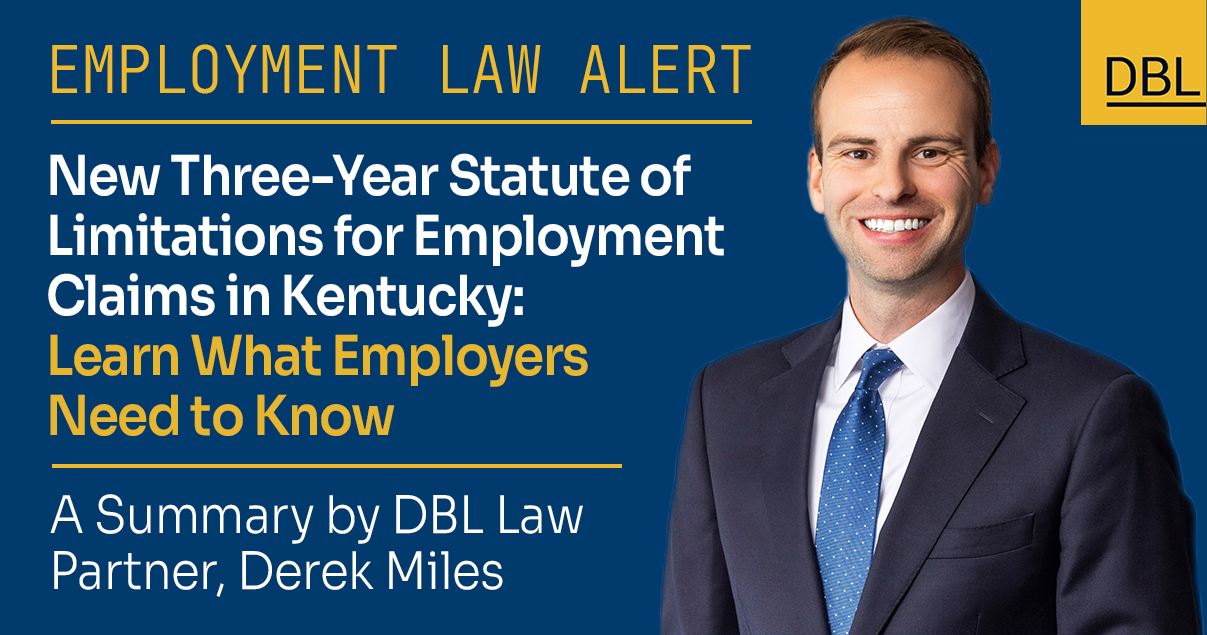On March 31, 2023, Kentucky made a significant legislative move by passing Senate Bill 47, legalizing medical cannabis in the Commonwealth, effective January 1, 2025. This groundbreaking legislation presents both opportunities and challenges, especially for employers across Kentucky. Our goal with this series is to provide a better understanding of the legal landscape that will impact businesses as this new law comes into effect.
Throughout this series, we will explore three critical areas that employers need to be aware of:
- The Application Process and Types of Licenses Available – We’ll guide you through the steps involved in obtaining the necessary licenses and permits, covering the various types of licenses available for different aspects of the medical cannabis industry.
- Impact of Local Ordinances – We’ll examine how local governments are responding to the state law, whether additional requirements are being imposed, what that means for businesses operating in different regions.
- What Employers Need to Know – We’ll cover key considerations for employers, including workplace policies, employee rights, and potential liabilities.
- Join us as we delve into these topics with insights from our legal experts and industry leaders. We aim to equip you with the knowledge and tools you need to navigate this new era of medical cannabis in Kentucky.
With the deadline for medical marijuana applications rapidly approaching, stay tuned for our first episode, where we will begin our journey by exploring the application process and types of licenses that are available. Thank you for watching, and we look forward to having you with us throughout this series.”
DBL Law Attorneys’ Derek Miles and Madsion Gamble Johnson kick the series off with the below introduction video.
“Hello, I’m Madison Johnson from DBL Law, and along with mt colleague, Derek Miles, we’re excited to welcome you to our new video series on Medical Marijuana in KentuckyOn March 31, 2023, Kentucky made a significant legislative move by passing Senate Bill 47, legalizing medical cannabis in the Commonwealth, effective January 1, 2025. This groundbreaking legislation presents both opportunities and challenges, especially for employers across Kentucky. Our goal with this series is to provide a better understanding of the legal landscape that will impact businesses as this new law comes into effect.
Throughout this series, we will explore three critical areas that employers need to be aware of:
- The Application Process and Types of Licenses Available – We’ll guide you through the steps involved in obtaining the necessary licenses and permits, covering the various types of licenses available for different aspects of the medical cannabis industry.
- Impact of Local Ordinances – We’ll examine how local governments are responding to the state law, whether additional requirements are being imposed, what that means for businesses operating in different regions.
- What Employers Need to Know – We’ll cover key considerations for employers, including workplace policies, employee rights, and potential liabilities.
- Join us as we delve into these topics with insights from our legal experts and industry leaders. We aim to equip you with the knowledge and tools you need to navigate this new era of medical cannabis in Kentucky.
With the deadline for medical marijuana applications rapidly approaching, stay tuned for our first episode, where we will begin our journey by exploring the application process and types of licenses that are available. Thank you for watching, and we look forward to having you with us throughout this series.”
In video two of the series, DBL Law Attorney, Madison Gamble Johnson, discusses the Kentucky Medical Cannabis application process:
After Governor Beshear signed the Kentucky Medical Cannabis Program into law the Cabinet for Health and Family Services \issued two regulations that create the guidelines for the application process and the regulation of licenses. (915 KAR 1:01 and 1:020.)
Kentucky’s initial application window opened on July 1, 2024, and will close on August 31, 2024. During this period, the Cabinet will accept applications for several different types of licenses. These include:
Tier I, II, and III Cultivator Licenses; Processor Licenses; Dispensary Licenses and Safety Compliance Facility Licenses.
It is important to note that producer and Tier IV cultivator licenses are not available during this initial application period.
Additionally, there is a de facto prohibition on vertical integration at least during this initial round of licensing. With that said, applicants may submit multiple applications for the same license when certain conditions are met.
The Cabinet has also set a limit on the number of licenses that will be issued in this initial licensing process, these limitations are as follows:
- 10 licenses for Tier I Cultivator
- 4 licenses for Tier II Cultivator:
- 2 licenses for Tier III Cultivator:
- 10 licenses for the Processor Licenses
- 48 licenses to Dispensaries
- And no initial limit on the Safety Compliance Facility licenses.
The Cabinet has created further locale restrictions for dispensary licenses. The Cabinet divided the state into 11 regions and is limiting dispensary licenses to 4 per region, except where the region contains an urban county government, then that region may be issued 6 instead of 4, but no county shall have more than one.
Given the high level of interest, the Cabinet is expecting more applications than the initial application process allows, which will lead to a lottery to determine which applications will receive a license.
The actual Application Process will require the applicant to submit an initial license application to the Cabinet. This application can be found on the office of Medical Cannabis’ website but to highlight a few of the requirements, applicants must:
- Pay the Non-Refundable Application Fee, along with providing general Applicant and Business Entity Information.
- The applicant must also be able to demonstrate they have control of the site where the license will be issued and provide a Site Plan.
- The applicant must also provide evidence that they have Sufficient Capital for the planned business operation, by providing a Financial Plan and operational timeline.
This is an exciting opportunity to enter a new industry in the Commonwealth and be among the first wave of licensees issued. If you or your business needs regarding the application process, please contact DBL Law.
In addition to the state regulations, local governments, counties and cities have the option to opt out of allowing cannabis business operations within their jurisdiction. Under the current regulation, all local governments are automatically opted in. Therefore, local governments can either enact further restrictions on cannabis businesses in their jurisdiction or the local government can decide to place the issue of opting out on ballot. The local governments are able to pass resolutions to restrict business practices within their jurisdiction. These resolutions were required to be in place by August 13, 2024.
In addition, if a local government is opting out, it must submit this information to the state before January 1, 2025. If a county does opt out, KRS 218B.130 sets forth how cities within that county may still allow licensed cannabis businesses to operate within its city limits.
Currently, the state is maintaining a list of local jurisdictions who have enacted restrictions or plan to opt out on its website.
The period to opt out creates a potential issue where a business could obtains a license in an area that then decides to opt out. The state has a procedure in place if this happens. The state will issue a provisional license and the licensee will then have 120 days to identify and request a change of location for its licensed premises.





